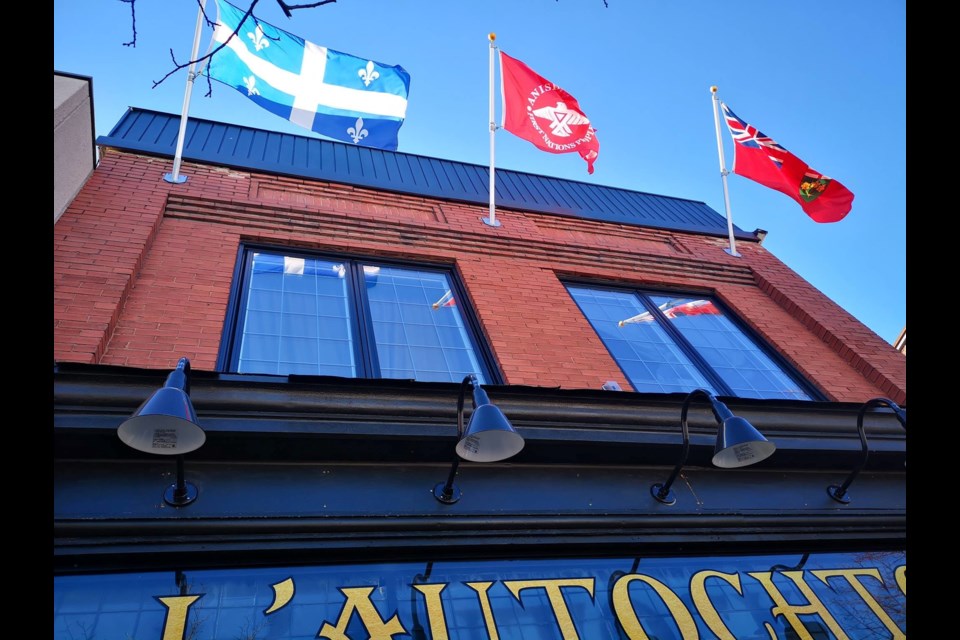A popular Indigenous restaurant in Temiskaming Shores is gearing up to reopen for the first time this month since being forced to shut due to pandemic-related lockdowns.
L'Autochtone Tavern Americaine — L'Autochtone is French for Indigenous — blends foods and techniques from English, French and First Nations culture, all while providing an urban and modern atmosphere surrounded by Indigenous pop art.
The downtown Haileybury restaurant will be offering more seats at its new patio — a product of the pandemic — on top of a full capacity of 30 indoor customers.
Its owner and chef, Gerry Brandon, hopes finally reopening the restaurant will resolve monetary challenges his business had to face during the pandemic.
L'Autochtone opened in April 2019 and hadn’t even finished its first year of operation before the pandemic hit. This halted plans for expansion and building the brand, including building a distillery at another building Brandon had just bought, expanding into catering, and building a food truck and portable bar for out-of-town events.
The restaurant lost around $1.5 million in gross sales in two years of the pandemic, and took another $300,000 in debt just to stay in business, Brandon said.
“If we can stay open long enough, all these issues will resolve themselves because we certainly do well when we're open."
Want to read more stories about business in the North? Subscribe to our newsletter.
While the province was under COVID-19 lockdowns, Brandon decided to open a retail store called Busters Mini-Mart, a cross between a coffee shop and a specialty foods grocery store, instead of taking takeout orders through L'Autochtone.
He explained that doing takeout wasn’t bringing in enough money to even pay staff. So they started preparing ready-to-go meals from pastries, deli foods, sandwiches, specialty coffee, and even birthday cakes. Busters also started to expand partnerships with Indigenous producers to add to supply.
“That went from a couple hundred dollars a week to a couple thousand dollars a week, then $3,000 to $4,000 a week, which we're now about to give up in the hopes of doing much more in the restaurant,” he said.
The Anishinaabe chef said he hoped the April 7 soft reopening will bring back L'Autochtone’s culturally diverse clientele, almost half of whom are from nearby Quebec, Northern Ontario, the U.S. and Europe.
“Night after night, the conversations aren't strictly across the table. It's so common to see people suddenly break into a conversation with a table beside them,” said Brandon, adding that they usually see large groups of people start to pull their tables together, in spite of not knowing one another and despite their language and cultural barriers.
“So to see a restaurant like this where you are bringing the three cultures together, you're bringing the francophone, the anglophone and Indigenous cultures into one space."
Brandon, 60, decided to move and build his restaurant in Temiskaming Shores to be closer to where he grew up in Northern Ontario.
A child of the Sixties Scoop, Brandon said his adopted family encouraged him to learn as much about his culture in a town where it was rare to see other Indigenous people.
“Even despite the fact that there are a number of reserves around town nowadays, I go into the same town and see a lot of Indigenous people and that shows you how much has changed,” he said.
The chef said he grew up reading and learning as much about Indigenous culture as he could, and hopes to bring what he’s learned to other people.
A member of Dokis First Nation, a reserve on the shores of the French River, near Lake Nipissing, Brandon spent a lot of time teaching on reserves around British Columbia, living amongst people as an “Aboriginal mentor” teaching about food and culinary arts while working with at-risk youth groups.
Before his time in BC, Brandon worked as a chef in southwestern Ontario, starting at a fine dining restaurant in London where he asked to work for free before being hired and eventually promoted to sous chef.
He was homeless and a heroin addict in Toronto in his teens until he set on a different path and got a college business diploma. He worked a corporate job before he eventually decided to learn culinary arts at the Stratford Chefs School.
Now back in Northern Ontario, he hopes to provide a different kind of dining experience to diners at L'Autochtone.
“It’s one of those things where people are going in (and saying,) ‘That’s an Indigenous restaurant, really?’ The best restaurant around is owned and operated by an Indigenous person. Like that's crazy,” he said.
“This is probably the first time in my entire career in hospitality where I've actually allowed my Indigeneity to be at the forefront and be represented in the business that I'm operating or working with.”



